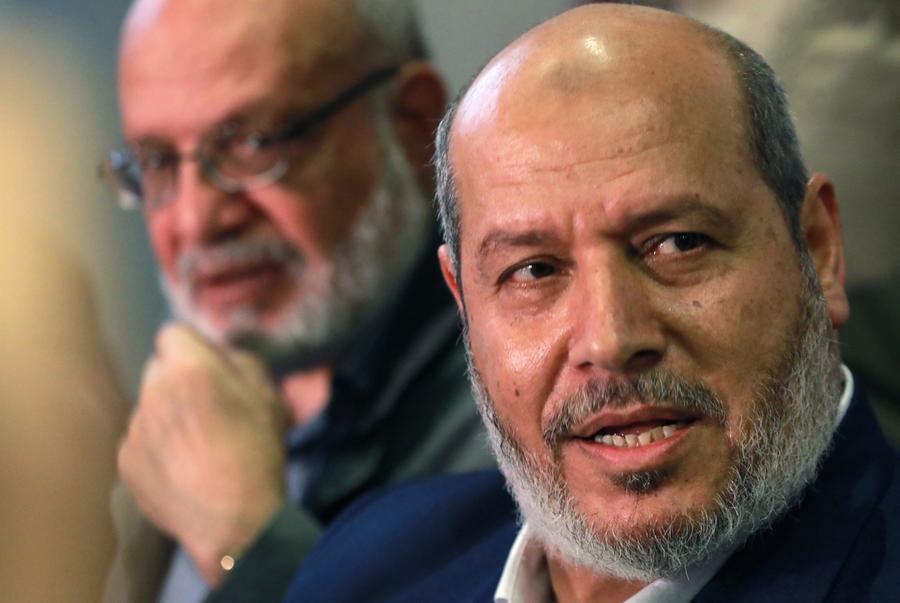Politics
Hamas Leader Links Disarmament to End of Occupation, Raises Tensions

Khalil al-Hayya, the acting co-chair of Hamas’ political bureau, has stated that the group will only consider disarmament if the “occupation” of Palestinian territories ends. This declaration appears to contradict the framework of the US-backed peace plan initiated under former President Donald Trump, which stipulates that Hamas would disarm following the return of hostages, with the Israel Defense Forces (IDF) withdrawing from Gaza thereafter.
In an interview with Al Jazeera, al-Hayya emphasized that disarmament is “linked to the presence of the occupation and aggression,” declaring that Hamas will only lay down its arms “if the occupation ends.” The precise definition of “occupation” remains ambiguous, as Hamas leaders frequently characterize the existence of Israel itself as a form of occupation.
Internal Palestinian Politics and Governance Proposals
During the same interview, al-Hayya revealed that Hamas has reached an agreement with rival factions, including Fatah, to form a technocratic governing committee to oversee Gaza. He did not provide details on when or how this committee would be established, nor did he clarify whether Hamas officials would participate. This announcement contradicts a recent statement from Fatah, the largest party in the Palestinian Authority, which dismissed the idea of such a committee and reaffirmed that the Palestine Liberation Organization (PLO) remains the sole legitimate body to govern both the West Bank and Gaza.
Both Israel and the United States have expressed their opposition to any role for Hamas in the future governance of Gaza, complicating the political landscape further.
Concerns Over International Peacekeeping Efforts
In a separate development, Jordan’s King Abdullah addressed the proposal for a neutral peacekeeping force, known as the International Stabilisation Force (ISF), as outlined in the Trump plan. This force is expected to include troops from various countries, including Indonesia, Pakistan, and Azerbaijan. However, Israel has insisted on maintaining veto power over any troop contributions, particularly concerned about the potential deployment of Turkish soldiers, which Prime Minister Benjamin Netanyahu views as a “red line.”
In an interview with the BBC, King Abdullah raised doubts about the feasibility of enforcing peace in Gaza through the ISF. He questioned the mandate of security forces in the region, stating, “What is the mandate of security forces inside of Gaza? We hope that it is peacekeeping, because if it’s peace-enforcing, nobody will want to touch that.” He highlighted the importance of supporting local Palestinian police forces, noting that Jordan and Egypt are prepared to provide training, but acknowledged that this process takes time.
Abdullah emphasized that any approach requiring armed patrols in Gaza would deter international involvement, stating, “If we’re running around Gaza on patrol with weapons, that’s not a situation that any country would like to get involved in.”
As discussions continue surrounding the future of governance in Gaza and the broader Israeli-Palestinian conflict, the contrasting statements from Hamas and Fatah underscore the complexities of achieving a lasting peace in the region.
-

 World2 weeks ago
World2 weeks agoGlobal Air Forces Ranked by Annual Defense Budgets in 2025
-

 World2 weeks ago
World2 weeks agoMass Production of F-35 Fighter Jet Drives Down Costs
-

 Top Stories2 weeks ago
Top Stories2 weeks agoNew ‘Star Trek: Voyager’ Game Demo Released, Players Test Limits
-

 Top Stories2 weeks ago
Top Stories2 weeks agoDirecTV to Launch AI-Driven Ads with User Likenesses in 2026
-

 Science2 weeks ago
Science2 weeks agoTime Crystals Revolutionize Quantum Computing Potential
-

 Lifestyle2 weeks ago
Lifestyle2 weeks agoLia Thomas Honored with ‘Voice of Inspiration’ Award at Dodgers Event
-

 Entertainment2 weeks ago
Entertainment2 weeks agoFreeport Art Gallery Transforms Waste into Creative Masterpieces
-

 Lifestyle1 week ago
Lifestyle1 week agoDiscover Reese Witherspoon’s Chic Dining Room Style for Under $25
-

 World2 weeks ago
World2 weeks agoElectrification Challenges Demand Advanced Multiphysics Modeling
-

 Health1 week ago
Health1 week agoGavin Newsom Critiques Trump’s Health and National Guard Plans
-

 Entertainment2 weeks ago
Entertainment2 weeks agoFast & Furious Coaster Hits the Track at Universal Studios
-

 Health2 weeks ago
Health2 weeks agoResearchers Uncover New Insights into Cancer Mortality Causes









